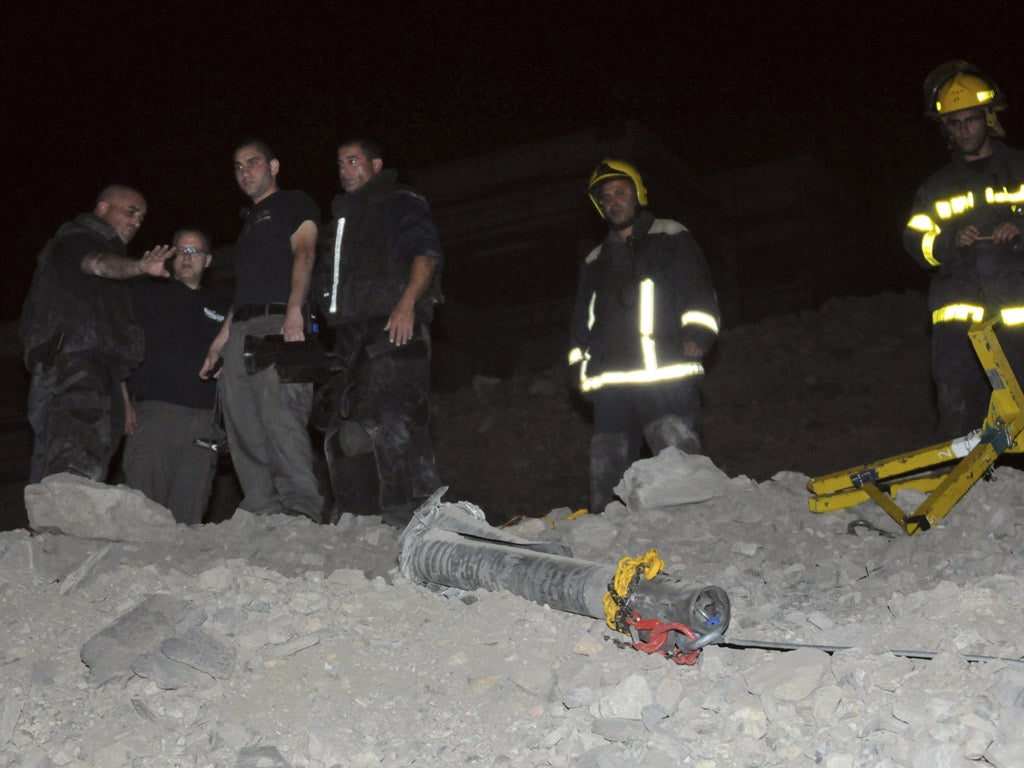Popular Israeli resort Eilat hit by rocket attack

Your support helps us to tell the story
From reproductive rights to climate change to Big Tech, The Independent is on the ground when the story is developing. Whether it's investigating the financials of Elon Musk's pro-Trump PAC or producing our latest documentary, 'The A Word', which shines a light on the American women fighting for reproductive rights, we know how important it is to parse out the facts from the messaging.
At such a critical moment in US history, we need reporters on the ground. Your donation allows us to keep sending journalists to speak to both sides of the story.
The Independent is trusted by Americans across the entire political spectrum. And unlike many other quality news outlets, we choose not to lock Americans out of our reporting and analysis with paywalls. We believe quality journalism should be available to everyone, paid for by those who can afford it.
Your support makes all the difference.A rocket fired from Egypt's Sinai desert hit a southern Israeli resort city, police said, raising new concerns about militant activity in the mountainous peninsula. Prime Minister Benjamin Netanyahu warned the Sinai was becoming a “terror zone.”
No injuries were reported in the overnight strike against Eilat, a normally tranquil Red Sea vacation spot. Eilat is set to welcome thousands of visitors this weekend for the Passover holiday.
There was no immediately claim of responsibility, but Israel has been warning of growing lawlessness in Sinai following the Egyptian uprising last year that overthrew Hosni Mubarak's regime. Israeli officials say weak policing and difficult terrain may be turning the peninsula into the latest focus of Islamic militant activity, including al-Qa'ida, in the region.
"We are seeing now with Eilat that the Sinai Peninsula is turning into a terror zone," Netanyahu said. "We cannot grant immunity to terror, we must fight against it."
When asked by Israel Radio if the rocket was launched from the Sinai, Eilat police chief Ron Gertner said "based on our working estimates and the range, yes."
Egyptian security forces and military aircraft were searching southeastern Sinai for militants believed to be behind the launch, Egyptian security officials said. They spoke on condition of anonymity because they were not authorized to talk to the press.
Last year, gunmen from the Sinai sneaked into Israel and ambushed vehicles on a desert highway, killing eight Israelis in a brazen, coordinated attack.
Israel accused Palestinian militants from Gaza of crossing westward into Sinai, making their way along the Israel-Egypt border and crossing back eastward into Israel to carry out the attack.
That incident suggested that Egypt's political upheaval and the resulting power vacuum was allowing Gaza militants with allies in Sinai to open a new front against Israel on its long-quiet frontier with Egypt.
Palestinian militants regularly fire rockets from the Gaza Strip into Israel, but launches from Egyptian territory are rare.
Thursday's launch appeared to be the first cross-border rocket attack from Egypt since Mubarak's fall. Rockets last hit Eilat and the nearby Jordanian town of Aqaba in 2010, killing one person and wounding four.
In a bid to keep out militants and illegal migrants, Israel has stepped up surveillance on the Egyptian border and is building an electronic barrier along the 230 kilometer (150 mile) frontier. It is expected to be completed by the end of the year.
Netanyahu acknowledged the fence "does not stop rockets," but promised "a solution will be found" to rockets from Egypt.
Israel has been battling rocket fire from Gaza with a short-range rocket interceptor, the Iron Dome. It was not immediately clear if there were plans to position a mechanism near the Egyptian border.
Most militant attacks in Sinai target Egyptian government targets, including police facilities and a natural gas pipeline that supplies Israel and Jordan. Islamic radicals who fled Egyptian prisons during the chaos surrounding last year's revolution sought asylum in Sinai, joining forces with disgruntled tribes and militant groups that already had built strongholds there.
Egypt became the first Arab nation to sign a peace treaty with Israel in 1979, but with the rise of Islamist parties who traditionally view Israel with hostility, Israel has become concerned that the accord may be under threat.
The Muslim Brotherhood, the largest party in Egypt's parliament, does not openly oppose the peace deal with Israel, but has said it would consider amending the pact to allow more Egyptian troops along the border with Israel. The deployment of Egyptian forces in the Sinai is limited under the 1979 deal.
AP
Join our commenting forum
Join thought-provoking conversations, follow other Independent readers and see their replies
Comments